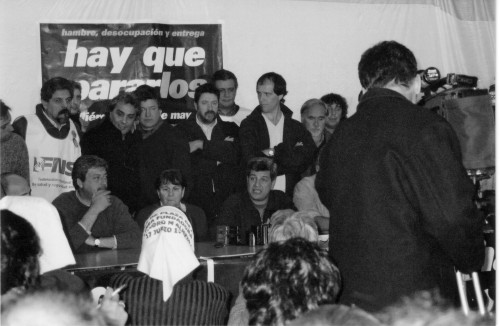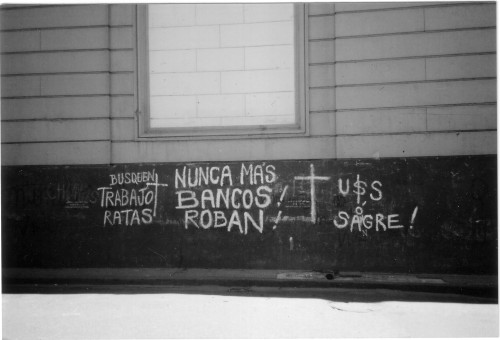Book Project
Argentina since the 2001 Crisis: Recovering the Past, Reclaiming the Future
Cara Levey, Daniel Ozarow, and Christopher Wylde (editors)
Network members and supporters have put together and edited collection of papers that has recently been published by Palgrave Macmillan. It is available to order here. For a limited time only a 30% discount is available between 1st August and 30th August 2016 entering the code PM16THIRTY. Book your copy now to take advantage of this exclusive offer!
Abstract
 Crisis is a term that is much used in the post-Lehman Brothers world. The subsequent responses and associated recoveries (or lack of) have been the subject of a cascade of academic, government, media, and think-tank investigation ever since. This volume will analyse crisis and its associated responses and subsequent recovery in the context of Argentina’s multiple social, economic and political implosion of 2001/02. However, this volume is unique in its understanding of the nature of how crisis and its impacts should be investigated and interrogated. First, it seeks to reject false dichotomies of ‘old’ and ‘new’; instead synthesising understanding to form an analysis that draws both elements of continuity and elements of change into the debate. Second, it recognises that crisis manifests itself in a number of realms – political, economic, social – and that heuristic devices employed to investigate them must subsequently also be drawn from a number of academic realms. This second point is in recognition of the fact that models of political economy, by their very nature and definition, come to encompass all aspects of social life and social reproduction.
Crisis is a term that is much used in the post-Lehman Brothers world. The subsequent responses and associated recoveries (or lack of) have been the subject of a cascade of academic, government, media, and think-tank investigation ever since. This volume will analyse crisis and its associated responses and subsequent recovery in the context of Argentina’s multiple social, economic and political implosion of 2001/02. However, this volume is unique in its understanding of the nature of how crisis and its impacts should be investigated and interrogated. First, it seeks to reject false dichotomies of ‘old’ and ‘new’; instead synthesising understanding to form an analysis that draws both elements of continuity and elements of change into the debate. Second, it recognises that crisis manifests itself in a number of realms – political, economic, social – and that heuristic devices employed to investigate them must subsequently also be drawn from a number of academic realms. This second point is in recognition of the fact that models of political economy, by their very nature and definition, come to encompass all aspects of social life and social reproduction.
Therefore, the neoliberalism of the 1980s and 1990s in Argentina (and Latin America more widely) manifested itself not just in economic policy but also in the nature of Argentina’s social contract, its cultural production and its very social fabric. The 2001-02 crisis in Argentina led to a rejection of the neoliberal model and therefore the responses and associated recovery can and indeed must be analysed and interpreted from a myriad of lenses in order to adequately capture the nature of important dynamics that are present in the response and recovery to the crisis of 2001/02.
Rationale & Original Contribution
 This timely publication seeks to understand and explain the many impacts of and contrasting responses to the Argentine political, economic and social crises of 2001-02. In this way, the volume illustrates how periods of unprecedented social upheaval permeate all aspects of state and society. The chapters in this volume critically examine the period in question through the lens of a range of disciplines, examining the relationship between cultural, political, economic and societal spheres and from the unique perspective of its ten year anniversary. This allows the book to analyse not only the crisis itself – and multiple understandings of the term – , but also the myriad of responses to it, as well as the long term dynamics of processes of recovery. The volume therefore includes the following topics: macroeconomic and social policy under the Duhalde and Kirchner presidencies, popular resistance, literary and cultural representations, and changing models of political economy. It includes chapters with original theoretical models that help to evaluate the various dynamics of the crisis, as well as presenting empirical work from a rich variety of disciplinary backgrounds that illuminate the various reactions to Argentina’s economic, political and social implosion across different sections of society and utilising different levels of analysis (from civil society to the state through to analysis of global processes). The terms “crisis”, “response” and “recovery” therefore extend beyond narrow understandings of the economy to encompass the political, societal and cultural fields. These different contributions are grounded in coherent analytical and polemical consistency which is aided by the co-authorship of the first chapter by the three editors, as well as the strict guidelines to which the volume contributors are to adhere.
This timely publication seeks to understand and explain the many impacts of and contrasting responses to the Argentine political, economic and social crises of 2001-02. In this way, the volume illustrates how periods of unprecedented social upheaval permeate all aspects of state and society. The chapters in this volume critically examine the period in question through the lens of a range of disciplines, examining the relationship between cultural, political, economic and societal spheres and from the unique perspective of its ten year anniversary. This allows the book to analyse not only the crisis itself – and multiple understandings of the term – , but also the myriad of responses to it, as well as the long term dynamics of processes of recovery. The volume therefore includes the following topics: macroeconomic and social policy under the Duhalde and Kirchner presidencies, popular resistance, literary and cultural representations, and changing models of political economy. It includes chapters with original theoretical models that help to evaluate the various dynamics of the crisis, as well as presenting empirical work from a rich variety of disciplinary backgrounds that illuminate the various reactions to Argentina’s economic, political and social implosion across different sections of society and utilising different levels of analysis (from civil society to the state through to analysis of global processes). The terms “crisis”, “response” and “recovery” therefore extend beyond narrow understandings of the economy to encompass the political, societal and cultural fields. These different contributions are grounded in coherent analytical and polemical consistency which is aided by the co-authorship of the first chapter by the three editors, as well as the strict guidelines to which the volume contributors are to adhere.
 This country-focused volume proposes to analyse the multiple and varied effects of the 2001 crisis and how it has been be addressed. Argentina represents a particularly interesting case, often resisting attempted theoretical categorisation by various scholars (for example, neither Casteñeda’s infamous ‘good left’ nor ‘bad left’ model can be readily attributed to Argentina). This publication seeks to move away from such attempts at categorisation, instead grounding its analysis in a truly interdisciplinary framework that offers a comprehensive overview of the different aspects and dynamics of El Argentinazo and its immediate and more long-term impacts on Argentine state and society.
This country-focused volume proposes to analyse the multiple and varied effects of the 2001 crisis and how it has been be addressed. Argentina represents a particularly interesting case, often resisting attempted theoretical categorisation by various scholars (for example, neither Casteñeda’s infamous ‘good left’ nor ‘bad left’ model can be readily attributed to Argentina). This publication seeks to move away from such attempts at categorisation, instead grounding its analysis in a truly interdisciplinary framework that offers a comprehensive overview of the different aspects and dynamics of El Argentinazo and its immediate and more long-term impacts on Argentine state and society.
SECTION & CHAPTER OUTLINE
Table of Contents FOREWORD – Colin Lewis, London School of Economics INTRODUCTION Revisiting the Argentine Crisis a Decade on: Changes and Continuities? Cara Levey, Daniel Ozarow, Christopher Wylde (Editors) PART I – The Political Economy of (Post) Crisis Argentina CHAPTER 1 Continuity and change in the interpretation of upheaval: Re-examining the Argentine Crisis of 2001-02 Christopher Wylde, Richmond the American International University in London CHAPTER 2 Post-Convertibility growth in Argentina: long term dynamics and limits, 1960-2008 Cecilia T. Lanata Briones & Rubén M. Lo Vuolo, LSE/ Centro Interdisciplinario para el Estudio de Politicas Publicas (Ciepp), Buenos Aires CHAPTER 3 Macro-economic governance in Post-neoliberal Argentina and the relentless power of TNCs: The case of the soy complex Miguel A. Rivera Quiñones, University of Sussex PART II – Social Movements and Mass Mobilisation before, during and after Que se vayan todo CHAPTER 4 “It’s the economy, stupid”, Or is it? The role of political crises in mass mobilisation: The case of Argentina in 2001 Olga Onuch, University of Oxford CHAPTER 5 Disagreement and hope: the hidden transcripts in the grammar of political recovery post-crisis Argentina Ana Cecilia Dinerstein, University of Bath CHAPTER 6 Argentina since 2001: From spontaneous uprising to ‘transition’, or a crisis intermezzo? Heike Schaumberg, University of Manchester CHAPTER 7 Revisiting Argentina 2001-2013: From ‘Que se vayan todos! to the Peronist Decade Maristella Svampa, CONICET (National Centre for Scientific and Technical Research),/ Universidad Nacional de la Plata PART III – Cultural and Media Responses to the 2001 Crisis CHAPTER 8 Tropical Buenos Aires: Representations of race in Argentine literature during the 2001 crisis and aftermath Ignacio Aguiló, University of Manchester CHAPTER 9 Desalambrando el aire: Communication and indigenous struggles in post-crisis Patagonia Saskia Fischer, Queen Mary, University of London CHAPTER 10 Assembling the past, performing the nation: The Argentine bicentenary and regaining of public space in the aftermath of the 2001 crisis Cecilia Dinardi, City University, London AFTERWORD – Ezequiel Adamovsky, University of Buenos Aires/CONICET
